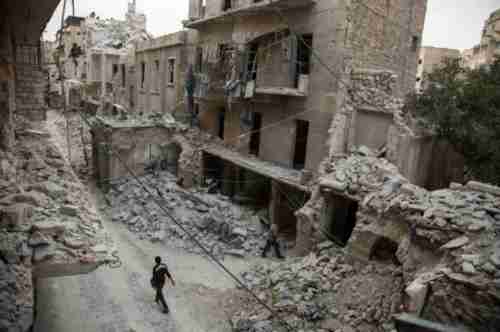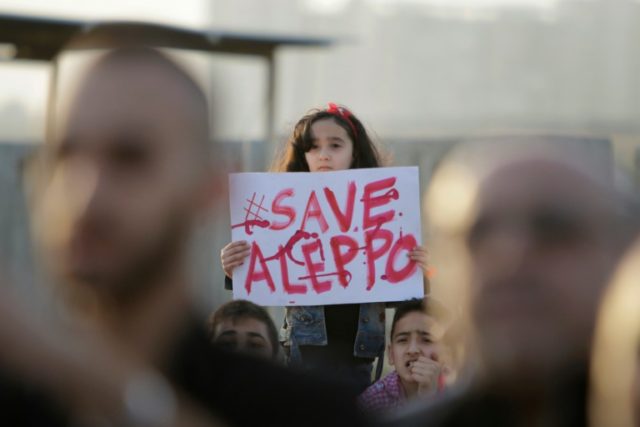This morning’s key headlines from GenerationalDynamics.com
- Hezbollah suffers blow in death of top commander Mustafa Amine Badreddine
- Iran suffers disastrous losses in battle of Khan Tuman
- Offensive to recapture Aleppo may be near collapse
Hezbollah suffers blow in death of top commander Mustafa Amine Badreddine

A neighborhood of Aleppo Syria, after being targeted by Syrian regime airstrikes (AFP)
Thousands of people on Friday attended the funeral in Beirut, Lebanon, of Hezbollah’s top military commander Mustafa Amine Badreddine, who was leading Hezbollah’s forces in the war in Syria. The death of Badreddine is a huge embarrassment to the terrorist group Hezbollah and to Hezbollah’s puppetmasters in Iran. Iranian officials immediately claimed that Badreddine was killed by a “huge blast” in Damascus, the capital city of Syria, and that the blast was caused by an Israeli air strike. However, Iran quickly backed down from that claim, since after all that claim would be even more embarrassing to Hezbollah and Iran than the truth.
The truth is that Badreddine was killed a week ago while leading Hezbollah and Iranian forces in Khan Tuman in Iran’s disastrous battle of Aleppo. It is believed that he was killed in battle, although there are unconfirmed conspiracy claims that either the Syrian regime or Israel had something to do with his death.
Hezbollah praised the “Martyr Badreddine”: In 1982, he formed jihadist groups to confront the Zionist entity. After becoming commander in 1992, he prepared many heroic operations against the Israeli occupation. With the inception of Syrian crisis in 2011, the martyr was one of the first commanders who confronted the takfiri plot across Syria, according to Hezbollah.
Badreddine’s death brings to an end a long manhunt by Israeli and Western intelligence services for the guerrilla leader who has managed to remain in the shadows while taking part in assassinations and military operations. Independent (London) and AEI Iran Tracker (13-May) and Al Manar (Hezbollah)
Iran suffers disastrous losses in battle of Khan Tuman
All last year, until Russia actively entered the war in Syria, we were reporting that Syria’s army was losing one city after another to the opponents of Syria’s president Bashar al-Assad. ( “5-Jun-2015 World View — With Syria’s army nearing collapse, Iran plans massive troop deployment”)
A major objective of Russia’s entry into the war was the recapture of Aleppo from opposition forces. For the past few months, there have been massive forces – combining forces from Syria’s regime army, Hezbollah, and Iran’s Islamic Revolution Guards Corps (IRGC) – focused on the recapture of Aleppo. ( “19-Feb-16 World View — Russia’s attacks on civilian hospitals in Aleppo follow the ‘Grozny model'”)
On May 6, IRGC forces were caught by surprise by an attack on Khan Tuman, south of Aleppo, by anti-Assad forces, killing and capturing about two dozen IRGC fighters, at a time when there was supposed to be a cease-fire in progress. This is the same battle in which Hezbollah’s top military commander Mustafa Amine Badreddine was killed.
Former commander of the 1980s Iran-Iraq War, retired general Mohsen Rezaei, was brought out of retirement, possibly to provide guidance to the IRGC forces in Aleppo. He said:
Some months ago Khan Tuman in south Aleppo was freed, but a few days ago, takfiris, taking advantage of a cease-fire at a time neither a plane nor artillery was active, surprise attacked Syrian forces and Iranian advisers.
[Expressing anger and dismay over the IRGC losses:] Their martyrdom shall not remain unavenged. We will liberate Aleppo soon and wipe out the takfiri terrorists.
IRGC major-general Qassem Soleimani was also dispatched to the region to provide moral support.
The loss of several dozen IRGC fighters is not a significant loss militarily, but it has big symbolic significance. It’s the first major setback for the IRGC forces in Aleppo. Other IRGC forces have suffered losses in other places in Syria, though not at this level. The strategic logic of Iran’s mission in Syria will likely drive the IRGC toward greater escalation in response to this setback. The Guard will want to avenge this defeat, moreover, and re-establish its credibility in the fight around Aleppo, which remains a strategically important prize for the Assad regime. Al-Monitor and Asharq Al-Awsat (London) and AEI Iran Tracker (12-May)
Offensive to recapture Aleppo may be near collapse
I like to reference Debka’s newsletter because it contains valuable insights into what’s going on, but it is written from Israel’s point of view, and sometimes gets things wrong. This week’s subscriber-only newsletter (sent to me by a subscriber) contains an analysis of the battle to recapture Aleppo, and says that it’s being stymied because of conflicting objectives among the three armies: Russia, Iran and Syria.
After the loss of Khan Tuman and the deaths of IRGC fighters, Syria’s president Bashar al-Assad demanded that Iran send more forces to Aleppo to defeat the rebels. Iran refused the request, and just sent IRGC major-general Qassem Soleimani to raise the morale of Iranian and Hezbollah forces, as previously described above.
According to Debka, al-Assad does not want to deploy his own army forces to Aleppo, because he wants to keep them close by in Damascus and Latakia to defend his own regime, even if it means losing Aleppo. This has inevitably infuriated both Iran and Russia, whose troops wonder why they’re fighting someone else’s battle. Russia in particular has no use for al-Assad and would except as a way of keeping control of Syria.
Russia’s forces entered the Syrian war actively last year to save al-Assad from losing the war. It may be that al-Assad will lose the war anyway. Debka
KEYS: Generational Dynamics, Iran, Islamic Revolution Guards Corps, IRGC, Mustafa Amine Badreddine, Syria, Aleppo, Khan Tuman, Hezbollah, Russia, Mohsen Rezaei, Qassem Soleimani
Permanent web link to this article
Receive daily World View columns by e-mail

COMMENTS
Please let us know if you're having issues with commenting.